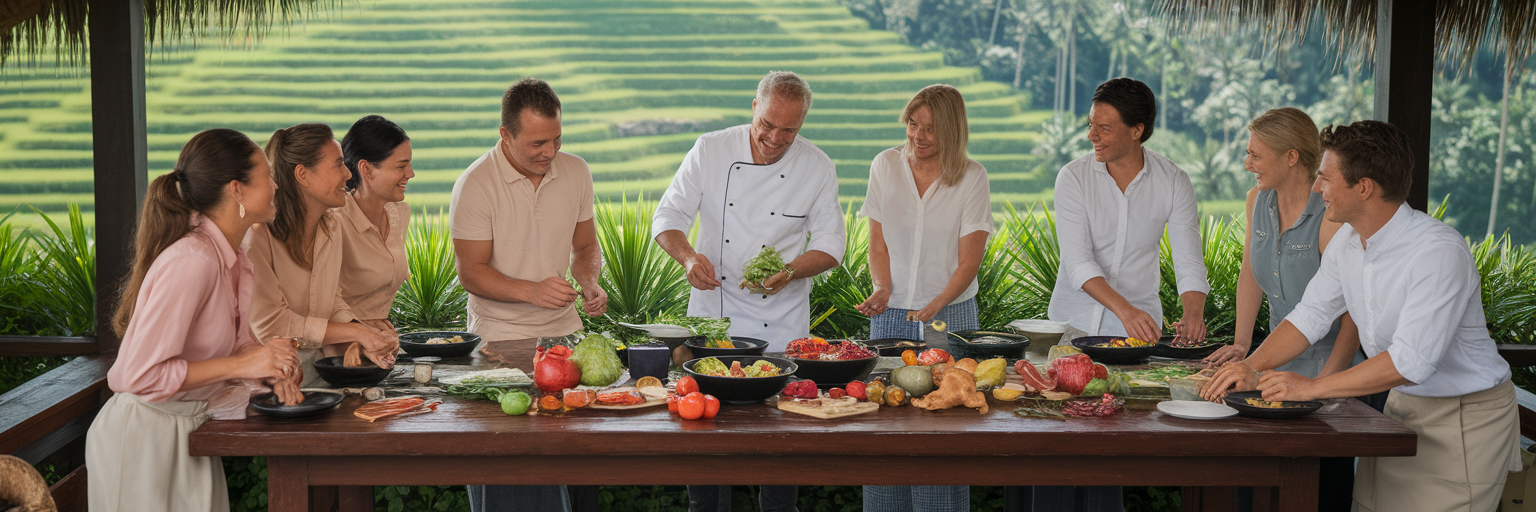Designing a Bali Incentive Trip with Lasting Impact
Learn how to create a luxury corporate retreat in Bali that leaves a positive and lasting legacy.

Learn how to create a luxury corporate retreat in Bali that leaves a positive and lasting legacy.

Corporate rewards used to be straightforward: a bonus, a new watch, a corner office. Today, top performers are looking for something more. They seek experiences that reflect their personal values and the ethics of the company they work for. This shift has given rise to meaningful corporate travel, a powerful approach that rewards employees while strengthening brand identity and talent retention.
Instead of just another beach holiday, imagine a trip that leaves your team feeling genuinely connected to a place and proud of their company’s impact. Bali stands out as the perfect setting for this new standard. It offers a rare blend of breathtaking natural beauty, a deeply spiritual culture, and a sophisticated infrastructure ready to support responsible luxury. For US-based planners, Bali provides an opportunity to design an incentive program that goes beyond indulgence to create a lasting, positive legacy.
The foundation of any impactful trip is where you stay. But what do eco luxury resorts Bali truly represent for a corporate group? It’s more than just encouraging guests to reuse towels. It’s about choosing partners who have built sustainability into their very structure.
True eco-luxury means properties designed in harmony with their surroundings. Think villas constructed with locally sourced bamboo and reclaimed wood, architecture that maximizes natural light and airflow to reduce energy consumption, and landscapes that preserve native flora. For corporate groups, this translates to an environment that feels both exclusive and deeply connected to Bali’s essence. Selecting the right partners is key, and the expert curation behind our event solutions ensures every detail aligns with this philosophy.
Look beyond marketing claims. A truly sustainable property can demonstrate its commitment through its operations. Ask about their water recycling systems, their zero-waste policies, and whether their kitchens are supplied by on-site organic gardens. As organizations like the UNWTO emphasize, well-managed tourism can be a powerful force for preservation. For corporate planners, verified certifications like Green Globe or EarthCheck serve as a reliable benchmark, confirming that a resort’s practices meet rigorous global standards.
Sustainability doesn’t mean sacrificing comfort; it enhances the luxury experience. A farm-to-table dinner featuring ingredients picked that morning offers a level of freshness and authenticity that a standard buffet cannot match. A guided trek through the resort’s protected forest, led by a local naturalist, becomes an exclusive adventure. These are the moments that transform a trip from memorable to meaningful, offering your team unique stories they will share for years to come.

A truly sustainable trip creates value that flows both ways. Moving beyond the typical tourist trail involves building genuine, respectful partnerships that empower local communities. This approach creates a more profound experience for your team and ensures your investment has a positive ripple effect long after you depart. It’s a core part of our mission to craft experiences with purpose.
Instead of sourcing event supplies from large distributors, we can partner directly with local artisans and family-owned businesses. Imagine welcome gifts handcrafted by a nearby village cooperative or event decor woven from traditional textiles. These choices infuse your event with authenticity and directly support the local economy. For a corporate group, activities can be designed to create shared experiences rather than passive observation.
Consider incorporating activities that offer both cultural immersion and direct community benefit:
These interactions do more than just entertain. They foster cultural understanding, give employees a deeper connection to the purpose of their trip, and help preserve Bali’s rich artistic heritage.
One of the biggest challenges in Bali MICE travel is moving large groups without leaving a heavy carbon footprint. With thoughtful planning, it’s entirely possible to explore the island’s wonders responsibly. The key is to prioritize low-impact transportation and smart itinerary design.
Instead of relying solely on standard motor coaches, consider chartering electric buses or a fleet of hybrid vehicles for group excursions. This immediately reduces emissions and sends a clear message about your company’s commitment. For more intimate explorations, guided e-bike tours through quiet villages and terraced rice paddies offer an immersive, human-powered way to experience the landscape up close.
Another effective strategy is to cluster activities regionally. By designing an itinerary that focuses on one area of the island at a time, you minimize travel time and the associated emissions. This also creates a more relaxed and immersive experience for your team, giving them more time to connect with a place instead of just passing through. To go a step further, we can partner with verified local reforestation projects in Bali, allowing you to offset the trip’s carbon footprint and contribute directly to the island’s ecological health.
| Transportation Mode | Environmental Impact | Guest Experience | Best Use Case |
|---|---|---|---|
| Standard Coach Bus | High | Conventional, efficient for large numbers | Airport transfers or long-distance point-to-point travel |
| Electric/Hybrid Bus | Low | Modern, quiet, and comfortable; reinforces sustainability message | Regional excursions and day trips for the entire group |
| E-Bikes | Very Low | Immersive, active, and allows access to smaller paths | Guided tours through villages and rice paddies for smaller breakout groups |
| Clustered Itinerary | Reduced | More relaxed pace, less time in transit | A core planning strategy to minimize overall travel distance |
This table provides a comparative overview to help planners select transportation methods that align with both their sustainability goals and the desired guest experience for their incentive program.

With your accommodations and logistics rooted in sustainability, the focus can turn to the content of the itinerary itself. The best corporate retreat ideas Bali has to offer are those that educate, inspire, and connect your team to the island’s unique philosophy. This is where a trip transforms from a vacation into a formative experience.
Think beyond the surface. Instead of a simple temple visit, imagine a private tour led by a cultural expert who can explain the Balinese philosophy of Tri Hita Karana—the harmony between humans, nature, and the divine. Rather than another catered group dinner, picture a hands-on cooking class at an organic farm, where your team harvests their own ingredients before learning to prepare a traditional Balinese meal. These activities are not just engaging; they build skills and create shared memories rooted in purpose.
You can also weave conservation elements into the agenda, such as a visit to a local sea turtle rehabilitation project or a workshop on coral reef restoration. As we've explored before, well-designed events are directly linked to employee commitment, and these purposeful activities reinforce that connection. Finally, a great itinerary balances structured group activities with ample personal time for reflection. This ensures your team returns not just rewarded, but genuinely rejuvenated and inspired.
How do you measure the ROI of a trip designed around purpose? For a sustainable incentive travel Bali program, the return extends far beyond the balance sheet. The true value lies in the powerful impact on your people and your brand.
When employees participate in an experience that aligns with their values, it builds a profound sense of pride and loyalty. They return to work not just rested, but re-engaged and more connected to the company’s mission. This boost in morale is a tangible asset.
Furthermore, the trip itself becomes a compelling story. It provides authentic content for your CSR reports, recruitment materials, and brand communications, showcasing your company as a leader in responsible business. A sustainable incentive trip is not an expense. It is a strategic investment in your talent, your brand identity, and your legacy. If you are ready to design an experience with this kind of lasting impact, we are ready to work with you to bring that vision to life.